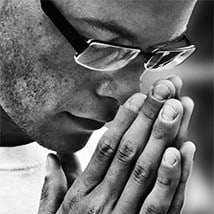Why not me?
By A. R. K.

Something I’ve noticed for a long time now, is how, when people experience suffering and sadness, a very common thing we find ourselves saying is, “Why me?” I’m sick, why me? I just lost my job, why me? My wife left me, I lost everything I’ve ever had, why me, why me, and on and on. “Why me?” has got to be the single most selfish question ever asked.
We seem to feel that suffering has no right to enter our lives. Out of the billions and billions of thinking beings, we are least deserving of our hardships and difficulties. I still wonder why that is. Not to say that I’ve not pondered the same question many times in my young life—guilty as charged! We’re born, we get old, and we die. We experience various forms of suffering before, during, and after each of these stages of existence, totally unavoidable. We constantly seek ways and means of making life pleasant throughout, but it seems the harder we try to make it better, the worse it actually gets.
The other day I was looking in the mirror, and noticed I have a generous sprinkling of gray hairs on my head. My first reaction was, “Why me? I’m only 28. I’m too young for this!” Then I realized how pathetic I sounded to myself. Things really could be a whole lot worse.
As a practitioner of Mahayana (Great Vehicle) Buddhism, the “Why me?” is even more selfish than in a mundane context. Persons who practice Mahayana are learning, practicing, and experiencing things in order to quell others’ suffering—all others. For a person wishing to tread the bodhisattva (person who has cultivated the wish to attain enlightenment for the sake of all beings) path, the question we should really ask, when we see others’ suffering, is, “Why not me? Why can I not take their suffering upon myself?” It is truly my wish to see pain and suffering eased.
We must find a way to ease others’ suffering with no thought of looking bad to others. As long as we know that we’re sincerely trying to help, others’ ill opinions do not matter.
Thank you for your time, may you all be well and happy.
Incarcerated people
Many incarcerated people from all over the United States correspond with Venerable Thubten Chodron and monastics from Sravasti Abbey. They offer great insights into how they are applying the Dharma and striving to be of benefit to themselves and others in even the most difficult of situations.


